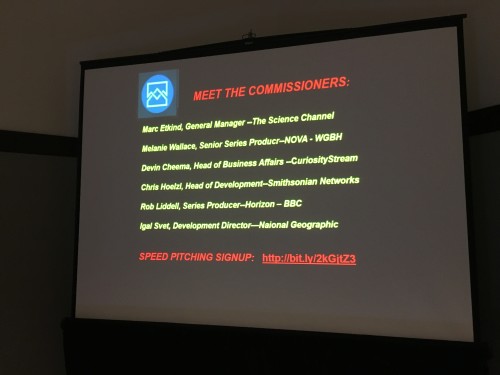
Talent seekers – the panel of top TV producers wanting documentary ideas from delegates at the American Association for the Advancement of Science in Boston.
By Matin Durrani in Boston, US
Physics World has been involved in making online videos and what we call “mini documentaries” for more than seven years. But these are mostly low-budget affairs aimed at people who are, by and large, already interested in physics.
So what if you’re a physicist who wants to work with a big-shot producer to make a full-blown, hour-long TV documentary watched by millions? Shows such as Horizon on the BBC or Through the Wormhole with Morgan Freeman on Discovery’s Science Channel get massive audiences, putting you in touch with far more people than most scientists could ever dream of.
A special session at this year’s annual meeting of the American Association for the Advancement of Science had some of the answers. It brought together a bevvy of top TV producers (see slide above) who shared their tips on how scientists should pitch ideas for documentaries to them. A further session will be held tomorrow to let scientists propose real ideas in a kind of TV-science speed-dating.
One tip to emerge is that TV producers like taking a single scientific question and then using their show to answer it. That might not be how scientists approach their own work in day-to-day life, but it’s what makes for a strong story. You can incorporate tangents and side issues, but the key is to have one thread running through the show.
It doesn’t mean a TV show can’t go into any kind of depth. “We like the details of how people know what they know,” said Melanie Wallace, senior series producer for Nova on PBS, which is watched by as many as five million viewers a week. “Don’t just tell people what you’re doing but how it was worked out using scientific principles.”
Producers also like big stuff – be it mega projects or huge ideas. Passion is another key ingredient they look for, which means that scientists who want to pitch their idea to a TV producer need to be enthusiastic. “You have to make people care about your work,” Wallace added.
But if you’re worried that the science might be mangled in the effort to turn your idea into a TV show, you might want to work with Chris Hoelzl, head of development at the Smithsonian Channel. As he explained to delegates at the AAAS meeting, the channel ensures that Smithsonian scientists review all content in its shows for scientific accuracy before they get broadcast.
So what if you’re a scientist who has absolutely no contacts in the TV industry? One solution is to approach an independent TV producer, who can work with you on crafting your idea into a pitch that one of their contacts in TV might then commission.
But don’t be too downbeat if your big idea never sees the light of day; not every story is meant for television. Indeed, short content on the Web can be just as effective for topics where there’s no strong narrative. And with high-quality cameras being cheaper than ever, it’s easy for anyone to have a go themselves.
Guidelines
Show/hide formatting guidelines
this text was deletedwhere people live in harmony with nature and animals</q>
Some text